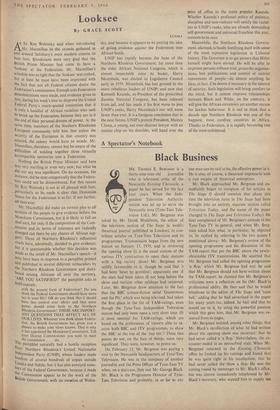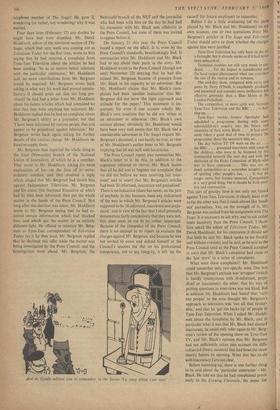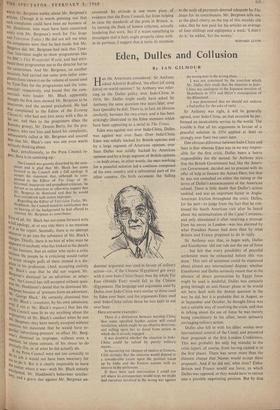A Spectator's Notebook
Black Business
MR. THOMAS E. BERGMAN is a thirty-nine-year-old journalist who is television critic of the Newcastle Evening Chronicle, a paper he has served for the last four years. When the Inde- pendent Television Authority station was set up to serve the Newcastle area (Tyne-Tees Tele- vision Ltd.), Mr. Bergman was asked by Mr. Derek 14oddinott, the editor of the television section of The Stage (a weekly theatrical journal published in London), to con- tribute articles on Tyne-Tees Television and its programmes. Transmission began from the new station on January 15, 1959, and in reviewing the opening show (it is the usual custom of the various ITV contractors to open their stations with a big variety show) Mr. Bergman was mildly favourable to it, though he said that ;t had been 'beset by gremlins'; apparently one 3f the stars had been taken ill not long before the show and various other mishaps had occurred. Later, Mr. Bergman drew attention to the fact that the BBC science-fiction serial `Quatermass and the Pit,' which was being televised, had taken the first place in the list of TAM-ratings, even though the Tyne-Tees Independent Television station had only been open a very short time. (It is most unusual for TAM-ratings, which are based on the preferences of viewers able to re- ceive both BBC and ITV programmes, to show the BBC at the top of the 'top ten.') These two points do not, on the face of things. seem very significant. They were, however, to prove so.
On February 13, Mr. Bergman was paying 3 visit to the Newcastle headquarters of Tyne-Tees Television. He was in the company of another journalist and the Press Officer of Tyne-Tees TV when, on a staircase, they met Mr. George Black. Mr. Black is the Programme Director of Tyne- Tees Television and probably, in so far as any one man can be said to be, the effective power in it. He is also, of course, a theatrical impresario with a vast empire of theatrical enterprises.
Mr. Black approached Mr. Bergman and im- mediately began to complain of his articles in The Stage (I should mention that about this time the television items in The Stage had been brought into an entirely separate section called Television Today, and the name of the paper changed to The Stage and Television Today). He later complained of Mr. Bergman's attitude to the Tyne-Tees TV in general, and when Mr. Berg- man asked him what, in particular, he objected to, he replied by referring to the two points mentioned above : Mr. Bergman's review of the opening programme and his discussion of the TAM-report that put the BBC above the newly- obtainable ITV transmissions. He asserted that Mr. Bergman had called the opening programme `a flop,' which Mr. Bergman had not; he said that Mr. Bergman should not have written about the TAM-report; he claimed that Mr. Bergman's criticisms were a reflection on his (Mr. Black's) professional ability. He then said that he would telephone to the editor of The Stage and 'raise hell,' adding that he had advertised in the paper for many years (as, indeed, he has) and that he would see to it, by using the powerful position whiCh this gave him, that Mr. Bergman was re- moved from its pages.
Mr. Bergman insisted, among other things, that Mr. Black's recollection of what he had written about the opening show was incorrect; that he had never called it 'a flop.' Nevertheless, the an- counter ended in an unresolved state. When Mr. Bergman returned to the Evening Chronicle office be looked up his cuttings and found that he was quite right in his recollection; that he had never called the show a flop. He sent the cutting round by messenger to Mr. Black's office, but was almost immediately telephoned by Mr. Black's secretary, who wanted him to supply the telephone number of The Stage! He gave if, wondering (or rather, not wondering) why it was wanted.
Four days later (February 17) any doubts he might have had were dispelled. Mr. Derek Hoddinott, editor of the television section of The Stage, which that very week was coming out as Television Today for the first time, wrote to him saying that he had received a complaint from Tyne-Tees Television about the articles he had been sending. `So as to restore better relations with the particular contractor,' Mr. Hoddinott said, no more contributions from Mr. Bergman would be required. Mr. Bergman wrote back asking in what way his work had proved unsatis- factory (I should point out that not long pre- viouslg he had had a letter from Mr. Hoddinott about his future articles which had contained no hint that they were anything but welcome). Mr. Hoddinott replied that he had no complaint about Mr. Bergman's ability as a journalist, but that 'I have been informed by various people that you appear to be prejudiced against television.' Mr. Bergman wrote back again asking for further details of this curious charge. Mr. Hoddinott re- fused to supply them.
Mr. Bergman then reported the whole thing to the local (Newcastle) branch of the National Union of Journalists, of which he is a member. They wrote to Mr. Hoddinott, asking for some explanation of his—on the face of it—extra- ordinary conduct, and they received a reply which alleged that Mr. Bergman had shown bias against Independent Television. Mr. Bergman and his union (the National Executive of which had by then been informed) then put the whole matter in the hands of the Press Council. Not long after this decision was taken, Mr. Hoddinott wrote to Mr. Bergman saying that he had re- ceived certain information which had shocked him, and which put the matter in an entirely different light. He offered to reinstate Mr. Berg- man as Tyne-Tees correspondent of Television Today (as it by then was). Mr. Bergman replied that he declined this offer while the matter was being investigated by the Press Council, and the investigation went ahead. Mr. Bergman, the Newcastle branch of the NUJ and the journalist who had been with him on the day he had had his encounter with Mr. Black sent affidavits to the Press Council, but none of them was invited to appear before it.
On January 21 this year the Press Council issued a report on the affair. It is, even by the Press Council's standards, breathtakingly bad. It summarises what Mr. Hoddinott and Mr. Black had to say about their parts in the story. Mr. Hoddinott wrote to the Press Council (though not until November 22) denying that he had dis- missed Mr. Bergman because of pressure from Mr. Black in his capacity as an advertiser. But Mr. Hoddinott claims that Mr. Black's com- plaints had been 'another indication' that Mr. Bergman did not have 'the right approach and attitude for the paper.' This statement is im- portant; for even if one accepts wholly Mr. Black's own assertion that he did not `either as an advertiser or otherwise' (Mr. Black's own curious phrase; sobviously Mr. Hoddinott would have been very well aware that Mr. Black was a considerable advertiser in The Stage) request Mr. Bergman's dismissal, it can hardly be true, in view of Mr. Hoddinott's earlier. letter to Mr. Bergman implying that all was well with his articles.
The Press Council report also summarises Mr. Black's letter to it. In this, in' addition to the argument referred to above, Mr. Black insists that all he did was to 'register our complaint that we did not believe we were receiving fair treat- ment' and to assert that Mr. Bergman's articles had been 'ill-informed, inaccurate and prejudiced.' There is no indication (there has never, on the part of anybody in this business, been any indication) of the way in which Mr. Bergman's articles were supposed to be 'ill-informed, inaccurate and preju- diced,' and in view of the fact that I shall presently demonstrate fairly conclusively that they were not, this does seem to me to be rather important. Because of the cowardice of the Press Council, there is no attempt in its report to evaluate the charges against Mr. Bergman, and because he was not invited to come and defend himself at the Council's sessions the slur on his professional competence, not to say integrity, is left 'on the Aml de Gaulle advises. you to remember in the future '1.e coup d'etat c'est 1110i: record' for future employers to remember.
Before I do a little evaluating (of the parts played by Mr. Black and Mr. Hoddinott) on my own account, one or two quotations from Mr. Bergman's articles in The Stage and Television Today should serve to show whether the charges against him were justified.
Tyne-Tees Television has only been on the air a fortnight, but it already seems as if it had ne■er been unheard-of.
Technical troubles arc still very much in e%i* .dence. . . . Yet the, impact is considerable and the local output phenomenal when one considers the size of the station and its newness.
The mid-day show, compered with verve and gusto by Terry O'Neill, is excellently produced and presented and contains more inoffensive but effective gimmicks than a Blue Moon at the London Palladium. . . .
The competition, or more aptly war, bets; een Tyne-Tees Television and the BBC • . . is hot- ting-up. . . . Tyne-Tees' weekly feature 'Spotlight' had scheduled a programme dealing with some schoolchildren's enquiry into the future and amenities of their town, Blyth. . . . It had obvi- ously taken a good deal of time to prepare the programme, shoot the necessary film, etc.. . .
The day before TT TV went on the air . . • the BBC . . . presented interviews with some of the children, who were to be featured by the commercial network the next day and with the chairman of the Parks Committee of Blyth who was to have appeared. . . . This was not so much competition as a somewhat naughty way of spoiling other people's fun. . . . It was no longer news, but feature material. Competition is a very good thing, but it should be both posi- tive and constructive.. .
This sort of gossipy item is not only not biased against Tyne-Tees Television; it clearly leans over so far the other way that it reads almost like 'hand- out' journalism. Yet, on the strength of it, Mr. Bergman was sacked from his assignment with The Stage. It is necessary to ask why, and to ask rather more incisively than the Press Council. I there- fore asked the editor of Television Today, Mr. Derek Hoddinott, for his comments (I should say that both he and Mr. Black spoke to me frankly and without evasion), and he said, as he said to the Press Council (and as the Press Council accepted in toto) that Mr. Black's complaint had come as the 'last straw' in a series of complaints.
What were these complaints? Mr. Hoddinott could remember only two specific ones. One was that Mr. Bergman's attitude was `arrogant' hich is hardly synonymous with ill-informed, preju- diced or inaccurate); the other, that his way of putting questions in interviews was not liked. But in addition Mr. Hoddinott had 'heard' that 'vari- ous people' in the area thought Mr. Bergman's approach to television was 'not all that favour- able,' and that he 'got the backs up' of people in Tyne-Tees Television. When I asked Mr. Hoddi- nott .about the complaint by Mr. Black, and in particular what it was that Mr. Black had deemed inaccurate, he could only refer again to Mr. Berg- man's review of the opening show on Tyne-Tees TV, and Mr. Black's opinion that Mr. Bergman had not sufficiently taken into account the diffi- culties (of illness, etcetera) that had beset the show shortly before its opening. What this has to do with inaccuracy I am not clear.
Before summing up, there is one further thing to be said about the 'particular contractor' —Mr.
Black. He told me that he had complained previ- ously to the Evening Chronicle, the paper for which Mr. Bergman works, about Mr. Bergman's articles. (Though it is worth pointing out that such complaints could have been no business of Mr. Hoddinott, who must have been concerned solely with Mr. Bergman's work for The Stage and Television Today.) He did not tell me what the complaints were that he had made, but Mr. Bergman did. Mr. Bergman had said that Tyne- Tees Television ought to show programmes like the BBC's This Wonderful World, and had attri- buted these programmes not to the director but to the cameraman. And Mr. Bergman, on another occasion, had carried out some tests (after com- plaints from viewers) on the volume of sound used by Tyne-Tees for the programmes and the 'com- mercials' respectively, and found that the com- mercials were louder. Mr. Black apparently thought the first item showed Mr. Bergman to be inaccurate, and the second prejudiced. He had first complained to the Editor of the Evening Chronicle, who had sent him away with a flea in his ear, and then to the proprietors (then the Kemsley group). Mr. Dennis Berry, for the pro- Prietors, who saw him and heard his complaints, subsequently called in Mr. Bergman and assured him that Mr. Black's case was not even worth Seriously thinking about. Rack, penultimately, to the Press Council re- Port. Here is its summing-up: The Council was gravely disturbed by the com- Plaint and is glad that Mr. Black has come forward to the Council with a full apology. It accepts his statement that, although he com- plained to the Editor of The Stage of 'ill- informed, inaccurate and prejudiced criticism,' he did not as an advertiser or otherwise request that Mr. Bergman be dismissed and that he would have considered such action improper. Regarding the Editor of Television Today. Mr. Hoddinott, the Council noted its satisfaction that on hearing of the background he had offered to rirstreinstate Mr. Bergman as contributor. of all, Mr. Black has not come forward with %full apology, or at any rate there is no mention of in the report. Secondly, there is no attempt atever to go into the substance of Mr. Black's Charges. Thirdly, there is no hint of what must be
qPParent to anybody who has looked at the details
°f this business, that an editor who sacks a critic because the people he is criticising would rather he wrote straight puffs of them instead is a dis- 44ee to his profession. (And, accepting entirely Mr. Black's case that he did not request. Mr. Bergman's s dismissal 'as an advertiser or other- Wise, , the Council has still accepted without ques- tion Mr. Hoddinott's denial that he dismissed Mr. Bergman because of `pressure from an advertiser, 0111.• George Black.' He certainly dismissed him Mr. Black's complaint, by his own admission, even if not at Mr. Black's request.) Nor has the Press Council seen fit to say anything about the PTPriety of Mr. Black's conduct when he met Mr' Bergman; they have merely accepted without question his. statement that he would have re- garded 'advertising-pressure' to effect Mr. Berg- rtie—gn s dismissal as improper, without even a let alone censure, of his threat to do Precisely this, or of what he did actually do. If the Press Council were not too cowardly to do its job it would not have been necessary for me to do it. But it is clearly impossible to leave exs'_ matter where it was—with Mr. Black entirely ulPated, Mr. Hoddinott's behaviour satisfac- tory' and a grave slur against Mr. Bergman un- answered. Its attitude is one more piece of evidence that the Press Council, far from helping to raise the standards of the press in Britain, is, by turning the flank of honest criticism, actually hindering that work. But if it wants something to investigate tha\ it feels might properly come with- in its purlieus, I suggest that it turns its attention , to the scale of payments deemed adequate by The Stage for its contributors. Mr. Bergman tells me, as the glace cherry on the top of this mouldy old cake, that he was paid for his articles an average of four shillings and eightpence a week. 'Ididn't do it,' he added, 'for the money.'
BERNARD LEVIN












































 Previous page
Previous page